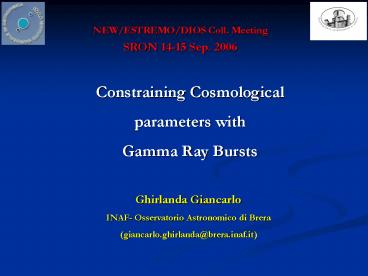GRB and Cosmology - PowerPoint PPT Presentation
1 / 36
Title:
GRB and Cosmology
Description:
Constraining Cosmological. parameters with. Gamma Ray ... flux) is 10-8 10-4 erg/cm2 (1keV 10 MeV) Assume Isotropy. Jet half opening angle. Jet effect ... – PowerPoint PPT presentation
Number of Views:36
Avg rating:3.0/5.0
Title: GRB and Cosmology
1
NEW/ESTREMO/DIOS Coll. Meeting SRON 14-15 Sep.
2006
Constraining Cosmological parameters with Gamma
Ray Bursts
Ghirlanda Giancarlo INAF- Osservatorio
Astronomico di Brera (giancarlo.ghirlanda_at_brera.in
af.it)
2
Prompt emission spectrum
GRB Peak Energy Epeak (i.e. where most of power
comes out)
F(E,z,) dE
4 ? dL(z)2
Eiso
1z
?E
3
Peak energy Isotropic energy Correlation
92 BeppoSAX GRBs
Epeak ? Eiso0.5
Amati et al. 2002
Epeak(1z)
Rest Frame
Eiso
4
21 GRBs (Batse, Hete-II, Integral)
Ghirlanda, Ghisellini, Lazzati 2004
Epeak ? Eiso0.5 X2357/28
Epeak(1z)
Eiso
5
GRB Global (isotropic) energetics
42 GRBs with z
6
Jet effect
? gtgt 1/?
? ? 1/?
7
Afterglow light curve presents achromatic break
Evidence that the GRB outflow is collimated
within a jet with a certain opening angle
AG break time
Jet opening angle
GRB 990510 Israel et al. 1999
8
21 GRBs (Batse, Hete-II, Integral)
?
1-cos(q)
Ghirlanda, Ghisellini, Lazzati 2004
Epeak ? Eiso0.5
Epeak(1z)
9
Peak energy vs. True energy
cr21.27
Epeak ? Etrue0.7
Ghirlanda, Ghisellini Lazzati 2004
Epeak(1z)
Epeak(1z)
10
Similar to Supernovae Ia
Stretching the slower the brighter
11
E1051 erg
Luminosity distance
The correlation reduces the scatter of GRBs in
the Hubble Diagram
GRBs can be used as cosmological RULERS !
redshift
12
CONSTRAINTS
Ghirlanda et al. 2006 AA
13
and its evolution (even darker)
Flat Universe Wtot1, WM0.27
P(w0wz)rc2
Firmani, Ghisellini, Ghirlanda Avila-Reese, 2005
14
Advantages of GRBs 1) detected in the Hard
X-ray band 2) very high redshift extension
SNAP
Ghisellini et al. 2005
15
Cosmology with GRBs Through the Ep-Eg correlation
- Large Number of events
- Measure spectral afterglow parameters with
accuracy - Study systematic effects
- Calibrate the distance indicators
16
Cosmology with GRBs requires
Prompt emission spectrum
Afterglow followup
(z, tbreak)
(Epeak, Fluence)
Deep afterglow monitoring up to several days
after the trigger (also z-dependent
effect) Multi-wavelength follow-up (achromatic ?
geometry)
17
ltEpeakgt - Eg,iso
12 BeppoSAX GRBs (Amati et al. 2002) 23 GRBs
(other than SAX) (Ghirlanda et al. 2004, Lamb et
al. 2004)
SWIFT contribution (since 2005)
51/168 GRBs with z
Epeak ? E?,iso0.550.01
?2530/47
13/51 GRBs with z Ep
18
and the contribution to the GRB sample used for
cosmology
5/13 GRBs with z Ep tbreak
19
Swift Early X-ray afterglow very well monitored
however lack of spectral capabilities to
constrain the prompt emission spectrum
need Epeak !!!
20
do we really need tbreak ?
A new correlation between Liso, Ep, T0.45
Good fit Consistent with other corr
ONLY PROMPT EMISSION PROPERTIES
Firmani et al. 2006
21
Cosmological Constraints with the Liso-Ep-T0.45
correlation
156 SN Ia
156 SN Ia
19 GRBs
19 GRBs
Firmani et al. 2006a
22
Cosmology with GRBs requires
Prompt emission spectrum
Afterglow followup
(z)
(Epeak, Fluence)
23
A minimal simulation
?(Ep)
?(L)?L-a
Ghirlanda et al. 2006
24
A minimal Simulation
150 Fake GRBs 1) C-SFR (Porciani Madau 1999) 2)
F(L) (e.g. Firmani 2004)
- Bursts satisfy the Ep-Eiso correlation (within
its scatter) - Bursts satisfy the Ep-Eg correlation (withing its
scatter) - Detectability Fluence gt 10-7 erg/cm2 in 2-400
keV (assuming a typical GRB spectrum) - Average parameter uncertainties
- Fluence ? 10
- Ep ? 20
- Tb ? 20
The simulated sample has a peak energy
distributed beteew 2keV and 1MeV
Ghirlanda et al. 2006 AA
25
Ghirlanda et al. 2006 AA Ghirlanda et al. 2006
JOP Review, GRB Special Issue
26
TEST on instr. energy range extension
The detection sensitivity is max for bursts with
Ep within the instrumental energy range ?E.
We should expect that for Ep ? ?E
?(spec. param) is inversely related to ?E
? ?(Ep)60 , ?(F)30 ? ?(Ep)40 , ?(F)20 ?
?(Ep)20 , ?(F)10
43 GRBs with Ep25,200 keV 127 GRBs with
Ep5,200 keV 150 GRBs with Ep2,1000 keV
?E1 15 300 keV ?E2 2 300 keV ?E3 2
1000 keV
Cosmological constraints are dominated by number
of events and precision on parameter estimates
27
(No Transcript)
28
(No Transcript)
29
Vary of GRBs by a factor 2
Vary param. Uncert. by a factor 2
30
The Future of Cosmology with GRBs Requires 1)
Larger sample (only 3-5 over 13 (out of 51) GRBs
with z Ep from Swift in 2yr) 2) Higher
accuracy in measuring spectral parameters (e.g.
below 10 on average, though flux-dependent) 2)
Calibrate the correlations
Instrumental energy band Lower energy extension
? detected of bursts (down to few
keV) (agrees with present pop studies) Lower
Upper energy extension ? accuracy of spectral
parameters (up to MeV)
31
The calibration problem
32
cr22.9
cr21.32
33
1.5 -1.5
34
0.2 - 0.1
35
Calibration of the correlation
Problem few events detected at very low
redshifts (e.g. 1.3 of 150 _at_ zlt0.5)
but do we really need very low redshifts?
e.g. 12 GRBs centered _at_ z1 with a redshift
dispersion of 0.15-0.2 are sufficient to
calibrate the Ep-Eg correlation at lt1 accuracy
Ghirlanda et al. 2006 AA
36
(No Transcript)































